Tribunal Statistics Quarterly: April to June 2024
Published 3 October 2024
1. Main Points
This publication presents tribunals statistics for the latest quarter (April to June, Q1 2024/25), compared to the same quarter of the previous year. It also includes annual data for the Employment Tribunals (ET) and Employment Appeal Tribunals (EAT) for 2023/24. The collection page with links to the accompanying documents for this publication can be found here.
This publication does not include all the tribunals – Upper Tribunal Immigration and Asylum (UTIAC) and the jurisdictional breakdown of ET are excluded. The total of the remaining jurisdictions is referred to in the accompanying tables as the ‘Interim Total’ and has been provided to allow like-for-like comparisons over time. In this bulletin, the total for all tribunals refers to the interim total. Details of what is not included is provided in each of the relevant sections of the main bulletin.
Data from the missing tribunals will be published as soon as they become available, and are quality assured.
| The interim[footnote 1] overall volume of receipts, disposals and open cases increased | In April to June 2024 His Majesty’s Courts & Tribunals Service (HMCTS) recorded a 13% increase in the total for receipts, and a 15% increase in the total for disposals, compared to the same quarter in 2023. Receipts have exceeded disposals over the last year, resulting in a 4% increase in open caseload to 668,000 over the same period. |
| SSCS receipts and disposals decreased whilst open cases increased | Compared to the same period in 2023, Social Security and Child Support (SSCS) receipts decreased by 8%, disposals decreased by 4% and open cases increased by 12%. The decrease in receipts was driven by decreases in Personal Independence Payment and Disability Living Allowance (by 11% and 34% respectively). The decrease in disposals was driven by a decrease in Personal Independence Payment (by 14%). |
| FTTIAC receipts and open cases increased, and disposals decreased | FTTIAC receipts and open cases increased by 82% and 94% respectively in April to June 2024 compared to the same period in 2023. Disposals decreased by 9% over the same period. |
| Employment Tribunal receipts and open caseload increased, while disposals decreased [footnote 2] | Single Employment Tribunal (ET) receipts and open cases increased by 19% and 18% respectively, while disposals decreased by 4% in Q1 2024/25, compared to the same period a year ago. In Q1 2024/25 lead multiple ET receipts, disposals, and open cases all increased, by 8%, 16% and 17% respectively compared to Q1 2023/24. |
| Gender Recognition Certificates receipts decreased whereas disposals and open caseload increased | This quarter there were 358 Gender Recognition Panel (GRP) applications received, 364 disposals and an open caseload of 885. GRP receipts decreased, while disposals and open caseload increased (by 2%, 38% and 8% respectively) in Q1 2024, compared to the same period in 2023. |
For feedback related to the content of this publication, please contact us at CAJS@justice.gov.uk
2. Statistician’s Comment
This quarter there was an increase in overall Tribunals receipts and disposals compared to the same period in 2023/24. However, the number of receipts received has exceeded disposals over the year, resulting in a 4% increase in open caseload. The increase in receipts is driven by a continued elevation in FTTIAC claims, in addition to continued increases in SEND. The rise in disposals is driven by an increase in ET multiples (although these are prone to volatility), Residential Property Tribunal and SEND over this period.
The annual Employment Tribunal data included in this publication shows that the majority (59%) of claimants continue to be represented by a lawyer at Employment Tribunal, although nearly a third (31%) provided no representation information in 2023/24. Age Discrimination jurisdictions claims received the highest average (mean) award compared to other discrimination jurisdictions over the same period.
3. Overview of Tribunals
The receipts total was 99,000 and the disposals total was 83,000 in Q1 2024/25
In April to June 2024, HMCTS recorded a 13% increase in the total for receipts, and a 15% increase in the totals for disposals, when compared to the same quarter in 2023. Over the year, receipts exceeded disposals and the open caseload total increased by 4%, to 668,000, over the same period.
This publication does not include Upper Tribunal (Immigration and Asylum Chamber) data from Q2 of 2021/22 and Employment Tribunals data for Q1 2021/22 due to database migration as stated above. The total of the remaining jurisdictions is referred to in this publication and accompanying tables as the ‘Interim Total’ and has been provided to allow consistent year-on-year comparisons over time.
This summary bulletin focuses mainly on the Social Security and Child Support (SSCS) Tribunal, the First-tier Tribunal Immigration and Asylum Chamber (FTTIAC), and the Employment Tribunal as they made up the majority (76%) of tribunal receipts in April to June 2024:
- Social Security and Child Support (SSCS) - 32% of receipts
- Employment Tribunal (ET) - 27% of receipts
- First-tier tribunal Immigration and Asylum Chamber (FTTIAC) - 17% of receipts
Figure 3.1: Receipts interim totals, Q1 2020/21 to Q1 2024/25 (Source: Table S_2)
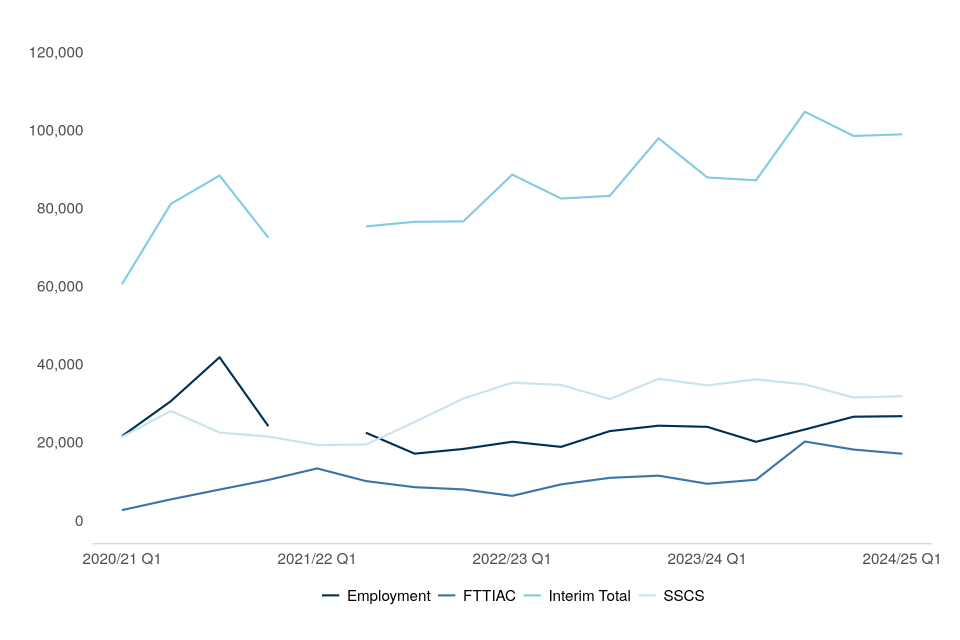
Figure 3.2: Disposals interim totals, Q1 2020/21 to Q1 2024/25 (Source: Table S_3)

Figure 3.3: Open caseload[footnote 3] interim totals, Q1 2020/21 to Q1 2024/25 (Source: Table S_4)

The charts above show the trends in receipts, disposals and open caseload over the last five years for SSCS, FTTIAC, ET, and all tribunals overall (using the Interim[footnote 1] Total measure).
In April to June 2024, overall receipts increased by 13% compared to April to June 2023. This was driven by increases in FTTIAC and Special Educational Needs and Disability (by 82% and 78% respectively).
Overall disposals increased by 15% in April to June 2024 (to 83,000). The Employment Tribunal disposed of 66% more cases in Q1 2024/25 compared to Q1 2023/24. SSCS disposals decreased by 4% over the same period.
4. Social Security and Child Support
From April 2023 the SSCS Tribunal started to list cases using a new Scheduling and Listing solution. This, alongside HMCTS migrating to a new Strategic Data Platform, has resulted in some cases heard and decided using this new listing solution not currently being included in the data above. Revised, complete data will be published as soon as they are available.
SSCS receipts and disposals decreased whilst open cases increased, as receipts have continued to exceed disposals over the last year.
Compared to the same period in 2023, Social Security and Child Support (SSCS) receipts and disposals decreased by 8% and 4% respectively. Open cases increased by 12%.
Of the 29,000 disposals in Q1 2024/25, 61% were cleared at a hearing and of these, 60% had the initial decision revised in favour of the claimant (compared to 70% and 63% in the same period in 2023/24 respectively).
Figure 4.1: Social Security and Child Support receipts, Q1 2020/21 to Q1 2024/25 (Source: Tables SSCS_1)
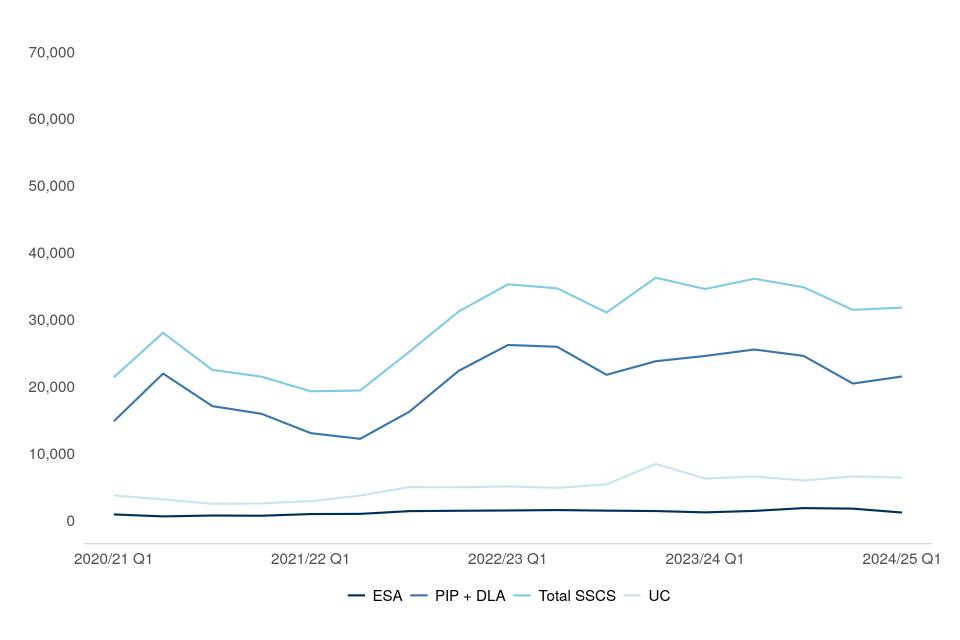
Figure 4.2: Social Security and Child Support disposals, Q1 2020/21 to Q1 2024/25 (Source: Tables SSCS_2)

Figure 4.3: Social Security and Child Support open caseload, Q1 2020/21 to Q1 2024/25 (Source: Tables S_4)
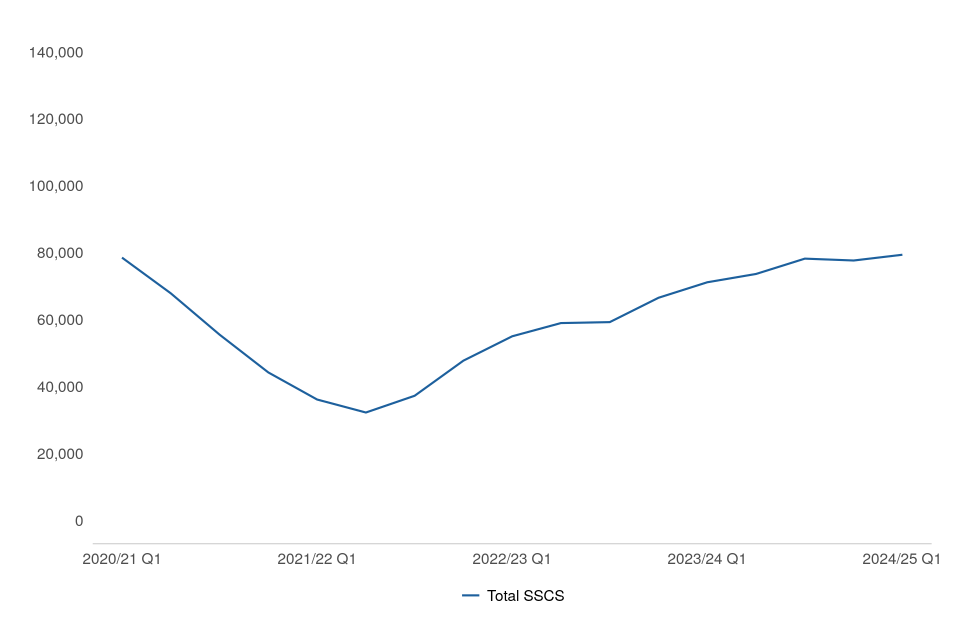
The economic impact of the COVID-19 pandemic resulted in an increase in the number of people on Universal Credit[footnote 4] (UC) as the employment rate decreased and economic inactivity increased. The Department for Work and Pensions (DWP) changes to benefit processes in response to the pandemic, such as the temporary suspension of face-to-face assessments for health and disability-related benefits, contributed to the general downward trend in receipts seen during the pandemic. As the policies put in place due to COVID-19 came to an end and restrictions were eased, SSCS receipts increased significantly from Q2 2021/22 and have remained relatively stable since Q1 2022/23.
SSCS receipts decreased by 8% this quarter, to 32,000, compared to April to June 2023. This was driven by decreases in Personal Independence Payment and Disability Living Allowance (by 11% and 34% respectively). PIP and UC appeals accounted for 64% and 20% respectively of all SSCS receipts in April to June 2024.
In April to June 2024, SSCS disposals decreased by 4% when compared to the same period in 2023 (from 30,000 in Q1 2023/24 to 29,000 in Q1 2024/25). PIP made up nearly two thirds (61%), and UC, around a fifth (21%) of SSCS disposals.
Of the disposals made by the SSCS tribunal, 18,000 (61%) were cleared at hearing, and of these, 60% were overturned in favour of the claimant (down from 70% and down from 63% on the same period in 2023 respectively). This overturn rate varied by benefit type, with PIP at 69%, Disability Living Allowance (DLA) 59%, Employment Support Allowance (ESA) 44%, and UC 49%. The PIP, DLA, ESA and UC overturn rates mostly decreased compared with April to June 2023 (PIP up 1, DLA down 4, ESA down 8 and UC down 5 percentage points).
There were 79,000 SSCS open caseload at the end of June 2024, an increase of 12% compared to the same period in 2023. SSCS open caseload decreased gradually between Q4 2017/18 and Q2 2021/22 (from a peak of 125,000 to 32,000), only rising in Q3 2019/20. However, SSCS open caseload has started to rise again, increasing in all except Q4 2023/24 of the quarters since Q2 2021/22.
Of those cases disposed of by the SSCS tribunal in April to June 2024, the mean age of a case at disposal was 35 weeks, an 8 week increase compared to the same period in 2023 (see table T_2).
5. Immigration and Asylum
First-tier Tribunal Immigration and Asylum Chamber (FTTIAC)
In April to June 2024, FTTIAC receipts increased by 82% to 17,000, compared to Q1 2023/24. Disposals decreased by 9% (to 9,300), over the same period.
In the same period, open caseload increased by 94% (to 58,000).
Figure 5.1: First-tier Tribunal Immigration and Asylum Chamber receipts, Q1 2020/21 to Q1 2024/25 (Source: Tables FIA_1)
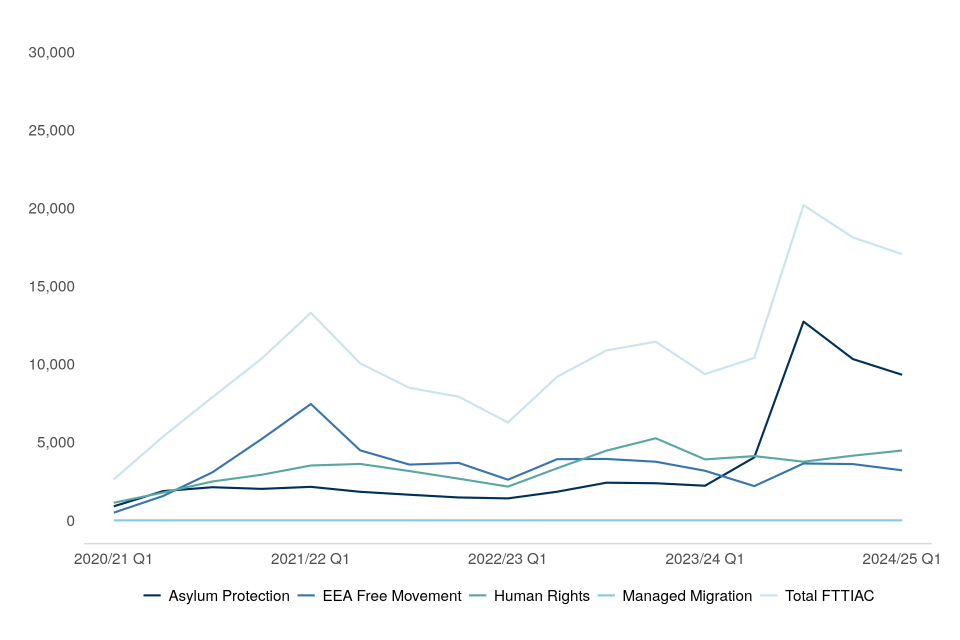
Figure 5.2: First-tier Tribunal Immigration and Asylum Chamber disposals, Q1 2020/21 to Q1 2024/25 (Source: Tables FIA_2)
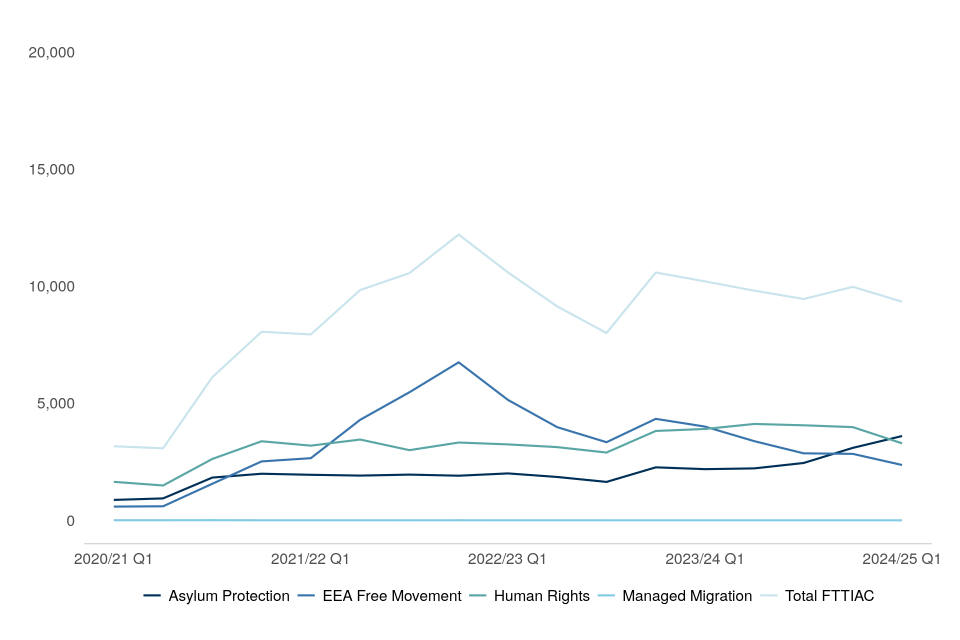
Figure 5.3: First-tier Tribunal Immigration and Asylum Chamber open caseload, Q1 2020/21 to Q1 2024/25 (Source: Tables S_4)

Following on from a steep fall in 2020/21 due to the impact of the pandemic, FTTIAC receipts started to return to pre-COVID-19 levels over the course of 2020/21. In 2021/22, FTTIAC receipts increased by 52% (to 40,000) compared to 2020/21 and over the course of 2022/23 decreased by 5% (to 38,000). This quarter receipts increased by 82% (to 17,000) compared to the same period last year. The raised level of appeals to the FTTIAC over the latest 3 quarters reported is driven by increases in Asylum/Protection/Revocation of Protection and Human Rights (by 321% and 15% respectively). This follows the Home Office’s work to tackle the backlog of legacy asylum claims.
Compared to Q1 2023/24, Asylum/Protection (AP) receipts more than quadrupled compared to the same period in 2023 (to 9,300) whilst Human Rights (HR) receipts increased by 15% to 4,500 over the same period. HR and AP proportionally represented 26% and 55% of all FTTIAC receipts respectively (down 15 and up 31 percentage points respectively from a year ago).
In Q1 2024/25, FTTIAC disposals decreased by 9% to 9,300. This fall in disposals was driven by decreases in EEA Free Movement and Human Rights (by 41% and 16% respectively). However, this was offset by a 65% rise in Asylum/Protection/Revocation of Protection disposals, which made up the largest proportion (39%) of all FTTIAC disposals in April to June 2024, up from 21% a year ago.
Of the disposals made in the FTTIAC this quarter, 68% were determined i.e. a decision was made by a judge at a hearing or on the papers (compared to 72% in Q1 2023/24); 17% were withdrawn (compared to 17% in Q1 2023/24); 3% were struck out for non-payment of the appeal fee (compared to 3% in Q1 2023/24), and 5% were invalid or out of time (compared to 3% in Q1 2023/24). Around half (45%) of the 6,400 cases determined at a hearing or on the papers were allowed/granted, although this varied by case type (45% of Asylum/Protection, 51% of Human Rights and 37% of EEA Free Movement appeals were allowed/granted).
In the FTTIAC, the mean time taken to clear appeals across all categories was at 43 weeks in the latest quarter, 2 weeks longer compared to the same period a year ago. Asylum/Protection, Human Rights and EEA Free Movement had mean times taken of 38 weeks, 46 weeks and 45 weeks respectively.
Upper Tribunal Immigration and Asylum Chamber (UTIAC)
In Q1 2024/25 UTIAC Judicial Review receipts increased by 15%, to 850, compared to the same period a year ago. Disposals increased by 70% to 1,200 whilst open caseload rose by 7%, to 1,400, compared to April to June 2023.
UTIAC Immigration and Asylum Judicial Reviews
This publication does not include receipts, disposals and open caseload figures for the Upper Tribunal Immigration and Asylum Chamber (UTIAC) due to this tribunal being migrated to new case management systems. The data will be published as soon as the work is completed, and the data has been checked and quality assured.
In April to June 2024, there were 850 Immigration and Asylum Judicial Review receipts and 1,200 disposals, an increase of 15% and an increase of 70% respectively on April to June 2023.
Of the 1,200 Immigration and Asylum Judicial Reviews disposed of, 47% were determined and 1% were transferred to the Administrative Court. The remaining 52% were in the ‘Other’ category, which includes cases that were withdrawn or not served.
During April to June 2024, 580 UTIAC Judicial Review applications were determined by paper hearing, of which 14% were allowed to continue to the substantive hearing stage. A further 120 were reconsidered at an oral renewal, of which 95% were allowed to continue to the substantive hearing stage. There were 22 substantive hearings which were determined in April to June 2024 of which 50% were granted in favour of the appellant (see table UIA_3).
6. Employment Tribunals
Employment Tribunal single cases
In Q1 2024, the Employment Tribunal received 10,000 single claim receipts and disposed of 7,000 single claim cases. There were 37,000 single claim cases in the open caseload at the end of June.
Employment Tribunal lead multiple cases
There were 800 lead multiple cases received and 530 cases disposed of in Q1 2024. The number of open lead cases stood at 6,600 at the end of June.
Employment Tribunal multiple cases
This quarter there were 17,000 Multiple claim receipts, 14,000 disposals and the open caseload stood at 413,000 at the end of June.
Employment Tribunals transitioned to a new database (Employment Case Management) during March to May 2021. It has not been possible to provide full results from both databases during this migration period on a consistent basis. Therefore, Employment Tribunal (ET) data is not available for Q1 2021/22, and as a result we are unable to present data for the full financial year of 2021/22.
From September 2022, the Employment Tribunal migrated to a new case management system (ECM Reform). Due to the migration process, the data on Employment Tribunals does not include jurisdictional breakdown for receipts or disposals. The Employment Tribunal timeliness cannot be provided due to there being no jurisdictional data. The data will be made available as soon as possible when the data is extracted and quality assured.
In Q1 2024/25, there were 27,000 Employment Tribunals (ET) receipts, 37% (10,000) of which were single claims receipts, and the remaining 63% (17,000) were multiple claims receipts, within 800 lead multiple cases. The ET disposed of 21,000 cases in Q1 2024/25. At the end of Q1 2024/25, 450,000 open cases.
Figure 6.1: Index of Employment Tribunals single and multiple claim receipts, Q1 2020/21 to Q1 2024/25 (Source: Tables S_2)
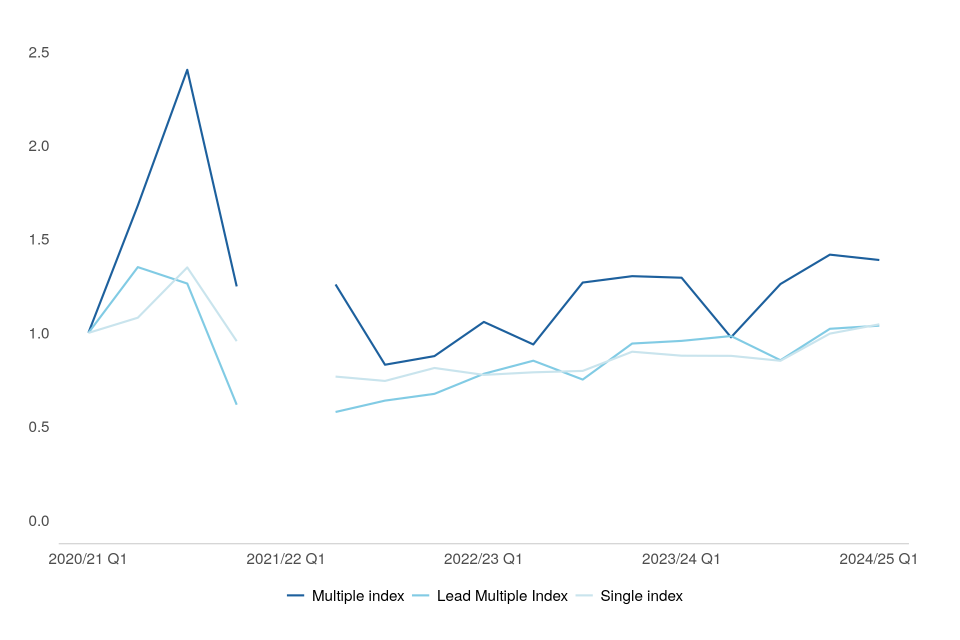
- Baseline 2020/21 Q1
Figure 6.2: Index of Employment Tribunals single and multiple claim disposals, Q1 2020/21 to Q1 2024/25 (Source: Tables S_3)
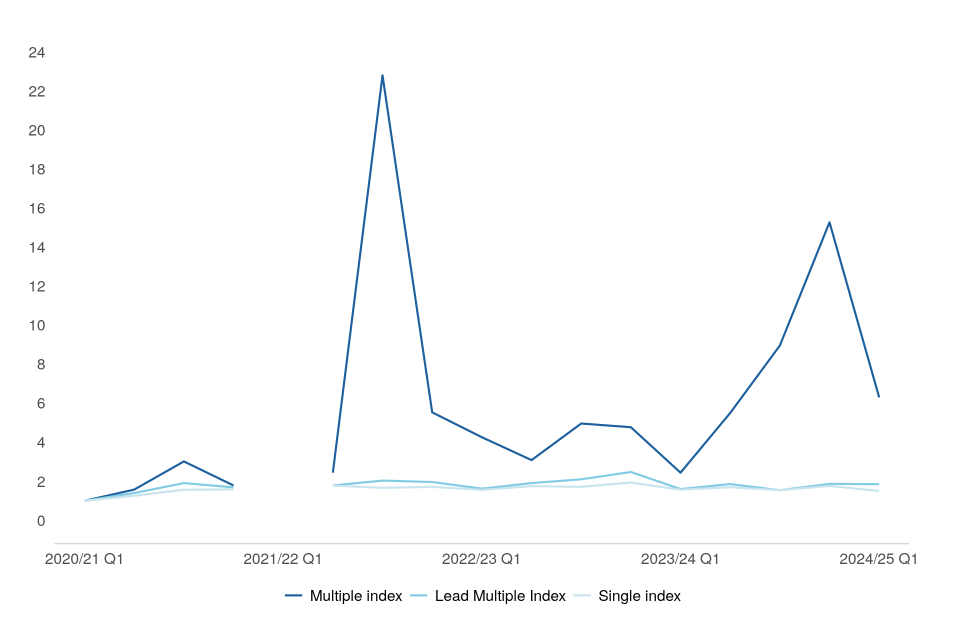
- Baseline 2020/21 Q1
Figure 6.3: Index of Employment Tribunals single and multiple claims open caseload, Q1 2020/21 to Q1 2024/25 (Source: Tables S_4)
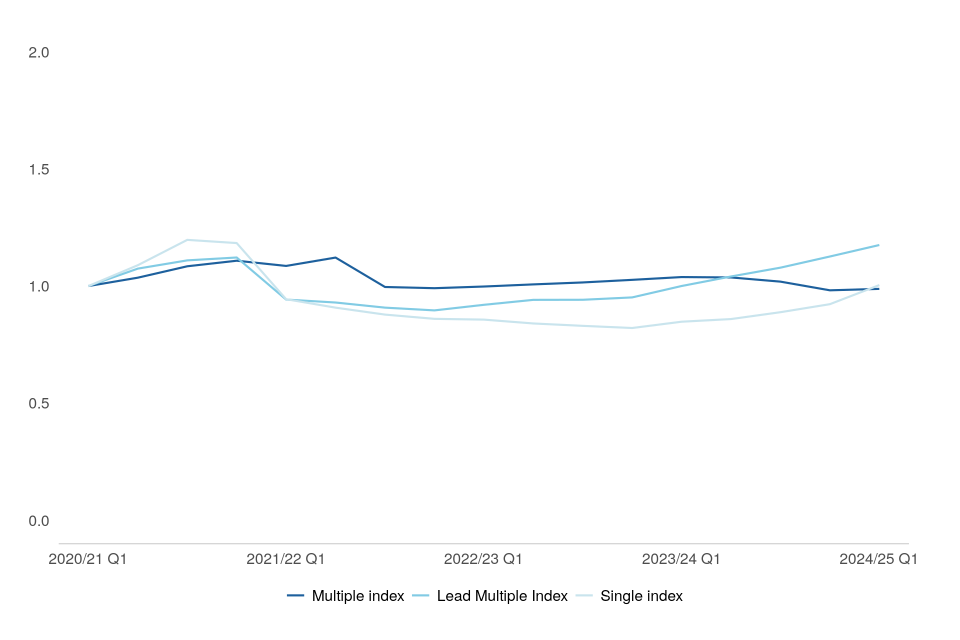
- Baseline 2020/21 Q1
Single claim open caseload (at 37,000) has fallen from a peak of 44,000 since Q3 2020/21, although this is up 18% compared to the same period in 2023/24.
There were 17,000 multiple claims received this quarter. Multiple claims tend to be more volatile as they can be skewed by a high number of claims against a single employer.
The peaks seen in the disposal chart in Q3 2021/22, Q3 2023/24 and Q4 2023/24 are due to large spikes in multiple claims:
- A dismissal judgment was issued in December 2021 for 48,000 British Airways claims covering 71,000 jurisdictions. These claims had been withdrawn over a number of years but given the volume and restrictions with the old case management system these had not been formally closed until now, hence the spike. This figure is expected to be revised again as there is still closure action to take place on some of the claims.
- From November 2023, a bulk case of multiple claims for equal pay against Glasgow City Council have been settled and subsequently withdrawn, resulting in the spike in disposals in Q3 and Q4 2023/24.
7. Employment Tribunal and Employment Appeal Tribunal, 2023/24
From September 2022, the Employment Tribunal has moved to a new case management system (Reform ECM). Cases in the new system are not included in the statistics. For this reason any maximum and average award amounts detailed only include cases from the legacy system.
In 2023/24, 59% of claimants were represented by a lawyer[footnote 5], down from 60% in 2022/23. Similarly, 31% of claimants in 2023/24 had no representation recorded[footnote 6], no change compared to 31% in 2022/23.
Costs and Compensation[footnote 7]:
In 2023/24, Age Discrimination jurisdictions claims received the largest average award (£100,000) compared to other discrimination jurisdictions. The highest maximum award in 2023/24, was for Sex Discrimination, at £995,000. Please note, this case was reported in table ET_5 in the previous publication for 2022/23. This case had a corrected judgment in 2023/24 and has therefore been included within this year with the previous year revised in the Employment Tribunal and Employment Appeal Tribunal annual tables published alongside this bulletin.
Claimant representation is recorded at the time of application and may change as a case progresses. The proportion of claimants represented by a lawyer in 2023/24 was 59%, down 1 percentage points compared to 2022/23. Representation information was not provided for 31% of claims, the same proportion compared to 2022/23.
The proportion of claims represented by a lawyer has remained relatively stable following a period of decline between 2016/17 and 2019/20. Similarly, claims with no representation (or where no rep information is provided) have remained relatively stable following a gradual rise between 2016/17 and 2019/20. Since the introduction of the online system several improvements have been made and a direct link to the form can be found on Gov.uk website, improving accessibility.
Figure 7.1: Representation of claimants at Employment Tribunals, 2005/06 to 2023/24 (Source: Table E_1)
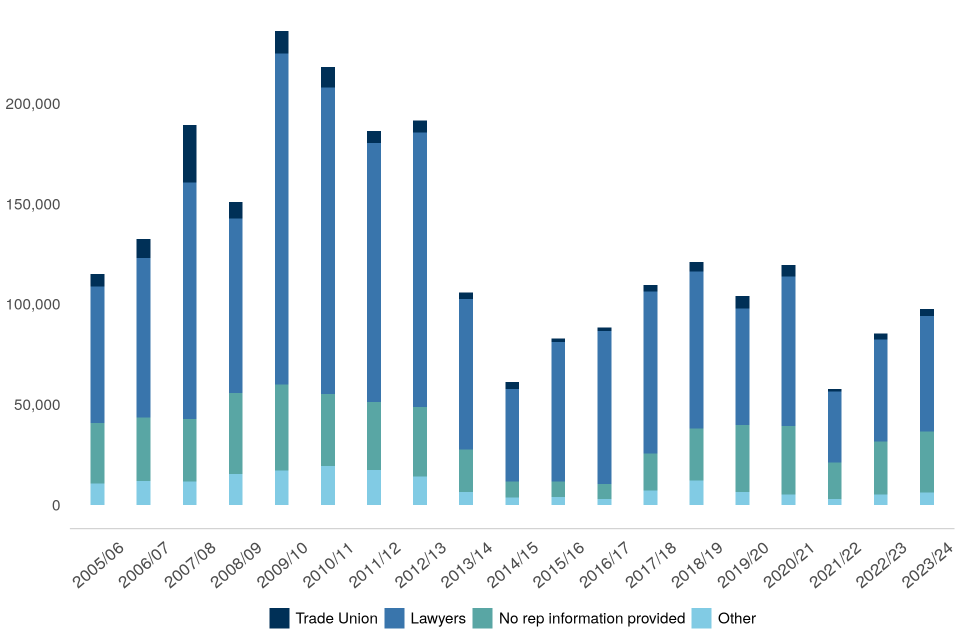
Centrally collated cost and compensation data is only published for Unfair Dismissal and each of the discrimination-based cases. In 2023/24, there were 650 claims that received compensation for Unfair Dismissal (a decrease of 18% compared to 2022/23), where the maximum award was £179,000 and the average (mean) award was £14,000. The trend in number of unfair dismissal claims receiving compensation fell between 2010/11 and 2020/21 (420), with a small increase recorded in 2018/19 (from 540 claims in 2017/18 to 660 claims). However, these have since increased to 650 in 2023/24).
There were 270 discrimination cases where compensation was awarded in 2023/24; the maximum amount awarded (£995,000) was in the Sex Discrimination jurisdiction.
Employment Appeal Tribunals (EAT)
In 2023/24, the Employment Appeal Tribunal received 1,500 appeals (an increase of 8% compared to 2022/23) and disposed of 1,000 appeals (an increase of 14% compared to 2022/23).
In 2023/24, 31% of appeals which were dealt with at a preliminary hearing were dismissed (26 of 83 appeals). This proportion is higher for appeals brought by employees, where 37% of appeals were dismissed compared to 19% of appeals brought by employers which were dismissed.
Of those appeals that reached an EAT final hearing, 43% were dismissed at full hearing. This proportion is higher for appeals brought by employers, where 54% of appeals were dismissed compared to 38% of appeals brought by employees which were dismissed.
Figure 7.2: Outcome of EAT Disposals, 2009/10 to 2023/24 (Source: Table E_11)

8. Gender Recognition Certificates
358 Gender Recognition Panel (GRP) applications were received and 364 were disposed of between April to June 2024; 885 applications were pending by the end of June 2024
The GRP received 358 applications this quarter, a decrease of 8 compared to April to June 2023. Of the 364 applications disposed of, a full Gender Recognition Certificate (GRC) was granted in 82% of cases (297 full GRCs), down 8 percentage points compared to the same period in 2023 (where 236 full GRCs were granted out of 264 disposals).
As expected, GRP receipts have increased annually since 2017/18, particularly more recently following a reduction in the application fee in May 2021 from £140 to £5, and the move to an online application process in July 2022. This has come at the same time as an increase in both the open caseload and refusals. Open caseload reached 885 cases in Q1 2024/25, while 16% of all disposals (57 cases) have been refused. Applications can be refused if they do not meet the required criteria. More information on the criteria can be found at the following link: https://www.gov.uk/apply-gender-recognition-certificate.
Since April 2005/06, when the Gender Recognition Act 2004 came into effect, 64% of interim certificates (171 of the 266 interim GRCs granted) have been converted to a full GRC, 52% of which were converted within 30 weeks. No interim certificates were converted to a full GRC between April to June 2024. The Divorce, Dissolution and Separation Act (2020), which took effect from 6th April 2022, changed the process for no fault divorces, reducing the need for interim certificates; we therefore expect to see a considerable drop in these. Of the 297 full certificates granted in April to June 2024, 30 were for married applicants and 262 for single applicants. 168 (57%) of the individuals granted full certificates were registered male at birth while 129 (43%) were registered female at birth.
Figure 8.1: Applications for Gender Recognition Certificates received, disposed of and pending, Q1 2020/21 to Q1 2024/25 (Source: Tables GRP_1 and GRP_2)

Figure 8.2: Full Gender Recognition Certificates granted by year of birth, 2019/20 to 2023/24 (Source: Table GRP_4)
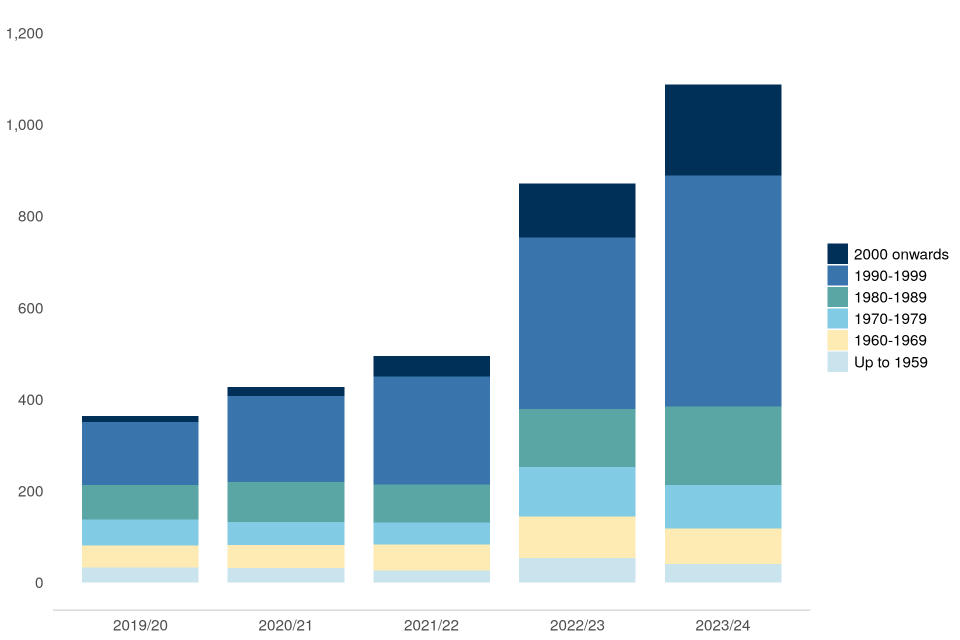
9. Other Tribunals
Special Educational Needs and Disability (SEND)
Increase in Special Educational Needs and Disability (SEND) receipts by 78% compared to the same quarter last year
Special Educational Needs and Disability (SEND) recorded 5,800 receipts this quarter, the highest amount in any quarter in the timeseries and an increase of 78% compared to the same quarter last year. In the same period, 4,600 appeals were disposed of - the highest number disposals in a quarter, and open caseload rose to 9,200 increases of 46% and 61% respectively.
SEN reforms in 2014 introduced Education Health and Care plans (EHCPs) and extended the provision of support from birth to 25 years of age. In addition, the National Trial which began in April 2018 enabled the Tribunal to make non-binding recommendations on the health and social care elements of the EHC plan. Those provisions were mainstreamed with effect from 1 September 2021.
Figure 9.1: Special Educational Needs and Disability (SEND) receipts, disposals and open caseload Q1 2020/21 to Q1 2024/25 (Source: Tables S_2, S_3, and S_4)
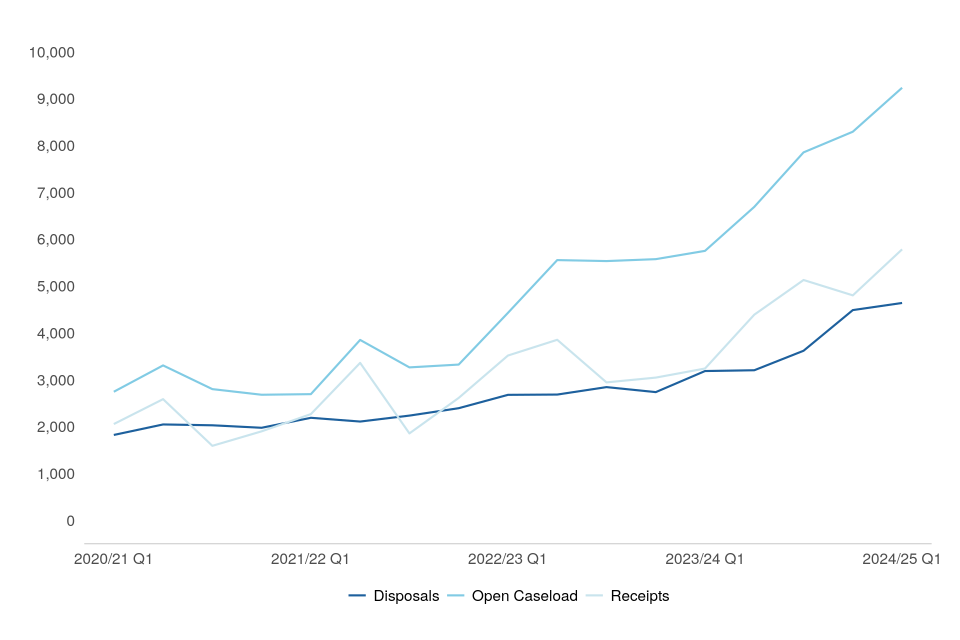
10. Further information
Rounding convention
Figures greater than 10,000 are rounded to the nearest 1,000, those between 1,000 and 10,000 are rounded to the nearest 100 and those between 100 to 1,000 are rounded to the nearest 10. Less than 100 are given as the actual number.
Accompanying files
As well as this bulletin, the following products are published as part of this release:
-
A supporting document providing further information on how the data is collected and processed, as well as information on the revisions policy and legislation relevant to trends and background on the functioning of the tribunal system.
-
The quality statement published with this guide sets out our policies for producing quality statistical outputs for the information we provide to maintain our users’ understanding and trust.
-
A set of overview tables, covering each section of this bulletin and a set of annual Employment Tribunal and Employment Appeal Tribunal tables including data to 2023/24.
-
A set of CSV files including data on overall receipts and disposals CSV, covering all tribunal types.
-
Additional releases this quarter:
- Update to the statistical notice on Immigration and Asylum (I&A) Detained Immigration Appeals (DIA) to include data to Q1 2024/25.
Future publications
Our statisticians regularly review the content of publications. Development of new and improved statistical outputs is usually dependent on reallocating existing resources. As part of our continual review and prioritisation, we welcome user feedback on existing outputs including content, breadth, frequency and methodology. Please send any comments you have on this publication including suggestions for further developments or reductions in content.
Official Statistics
Our statistical practice is regulated by the Office for Statistics Regulation (OSR).
OSR sets the standards of trustworthiness, quality and value in the Code of Practice for Statistics that all producers of official statistics should adhere to.
You are welcome to contact us directly with any comments about how we meet these standards.
Alternatively, you can contact OSR by emailing regulation@statistics.gov.uk or via the OSR website.
Contact
Press office - email: pressofficecourtslaw@justice.gov.uk
Other enquiries and feedback on these statistics should be directed to the Courts and People division of the Ministry of Justice:
Rita Kumi-Ampofo or Laura Jones - email: CAJS@justice.gov.uk
Next update: 12 December 2024
© Crown copyright Produced by the Ministry of Justice
For any feedback on the layout or content of this publication or requests for alternative formats, please contact CAJS@justice.gov.uk
-
The interim totals for the overall volumes of tribunal receipts, disposals and open caseload exclude the Upper Tribunal (Immigration and Asylum Chamber) for which the data is currently not available. See the main tables S_2, S_3 and S_4 for more information. ↩ ↩2
-
Includes single and lead multiple Employment Tribunal cases. ↩
-
Open caseload is based on a snapshot in time based on the last day of each quarter. ↩
-
Includes: represented by Solicitors, Law Centres and Trade Associations. ↩
-
For those individuals representing themselves, there is no need to provide information on representatives. Therefore, all cases where the representative information was left blank are included here. ↩
-
Cost and compensation are awarded per claim, not per jurisdiction. The compensation is usually allocated to the lead jurisdiction in the ET claim only. However, if it is not possible to show which jurisdiction type is the lead, the amount is divided equally for each type. ↩
